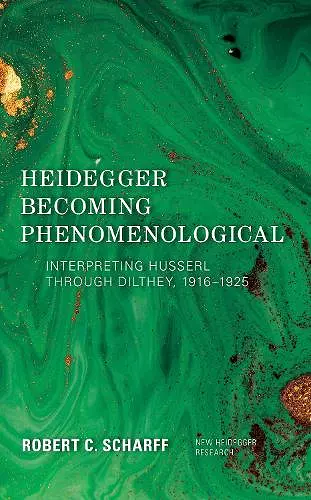Heidegger Becoming Phenomenological
Interpreting Husserl through Dilthey, 1916–1925
Format:Paperback
Publisher:Rowman & Littlefield International
Published:11th Dec '18
Currently unavailable, and unfortunately no date known when it will be back
This paperback is available in another edition too:
- Hardback£113.00(9781786607720)

In this first book-length study of the topic, Robert C. Scharff offers a detailed analysis of the young Heidegger's interpretation of Dilthey's hermeneutics of historical life and Husserl's transcendental phenomenology. He argues that it is Heidegger's prior reading of Dilthey that grounds his critical appropriation of Husserl's phenomenology. He shows that in Heidegger's early lecture courses, a "possible" phenomenology is presented as a genuine alternative with the modern philosophies of consciousness to which Husserl's "actual" phenomenology is still too closely tied. All of these philosophies tend to overestimate the degree to which we can achieve intellectual independence from our surroundings and inheritance. In response, Heidegger explains why becoming phenomenological is always a possibility; but being a phenomenologist is not. Scharff concludes that this discussion of the young Heidegger, Husserl, and Dilthey leads to the question of our own current need for a phenomenological philosophy—that is, for a philosophy that avoids technique-happiness, that at least sometimes thinks with a self-awareness that takes no theoretical distance from life, and that speaks in a language that is "not yet" selectively representational.
As Scharff sees it, Heidegger's way of becoming phenomenological was not Husserl's, who regarded phenomenology as a theoretical-scientific attitude of a transcendental subject expositing its intentional objects, but rather Dilthey's, who situates it in the whole of life that is always already there as an articulated historical context that mutually correlates self and world into a meaningful whole. -- Theodore Kisiel, Distinguished Research Professor Emeritus of Philosophy, Northern Illinois University
No one knows the Heidegger-Dilthey connection better than Robert Scharff, and in this revolutionary new work he pushes the reset button on the origins of Being and Time. Through a meticulous reading of the earliest courses Scharff reveals how Heidegger’s grappling with Dilthey turned him into a phenomenologist of life and eventually of Dasein, in contrast to the transcendental consciousness of Husserl. Written with clarity and verve, this book leaves the “Seinology” of later commentaries in the dust and restores to Heidegger’s work the existential vitality that is its birthright. -- Thomas Sheehan, Professor of Religious Studies, Stanford University
ISBN: 9781786607737
Dimensions: 222mm x 151mm x 17mm
Weight: 327g
214 pages